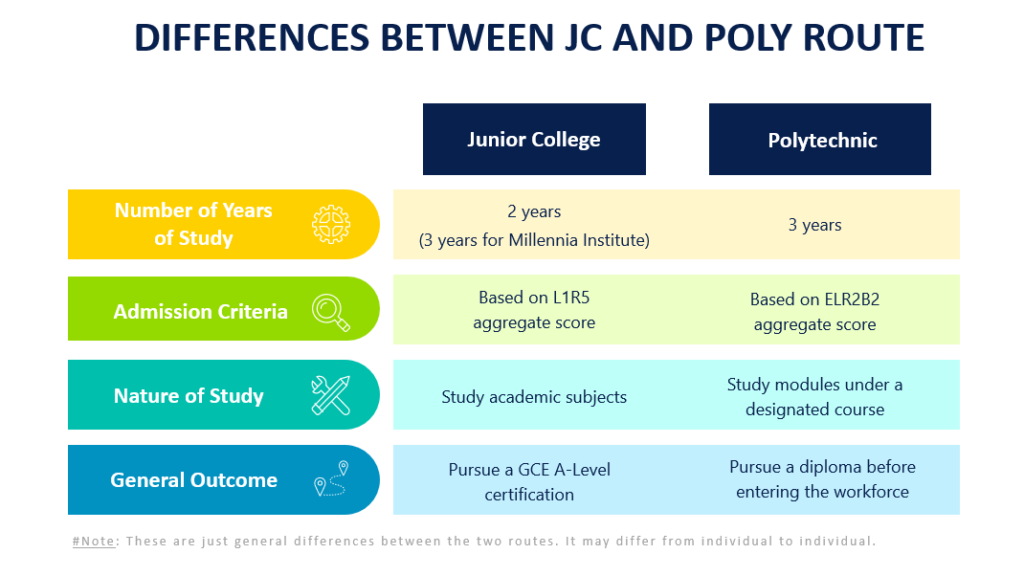Even though the GCE O-Levels Results Day is still a few weeks away, many of you might already be wondering which of the two – the Junior College (JC) or Polytechnic (Poly) route – is more suitable for you!
First, let’s consider what are the general differences between the two routes:

Advice #1: JC route is the more direct route if you intend to further your studies at local universities.
It has been statistically proven that the percentage of Junior College (JC) students being accepted into local universities is 75 per cent while for Polytechnic students, it is 17 per cent.
Hence, the JC route is the more direct route to take if you have already set your eyes on a particular local university (NUS, NTU and SMU).
Conversely, Poly students face stiff competition and those who are able to enter the local universities of their choice are considered the cream of the crop.
Advice #2: Getting into JC is just as tough as getting into Poly.
Yes, indeed! The admission score for JCs rests upon the L1R5 (First Language and 5 Relevant subjects) while the admission score for Poly rests upon the EL1R2B2 (English Language as EL1, 2 Relevant subjects as R2 and 2 Best subjects as B2). Despite both aggregate scores being computed differently, they are as competitive.
JC cut-off Points are cutthroat. For instance, esteemed JCs like Nanyang Junior College (NYJC), National Junior College (NJC) and Anglo-Chinese Junior College (ACJC) accept students with cut-off points of an L1R5 aggregate score of 6 to 9 on average.
On the other hand, there are only 5 polytechnics in Singapore. Despite providing a range of courses for students, popular courses like Business, Applied Science, Design and Media are tough to enter and only students with low EL1R2B2 would stand a higher chance of entering.
The MOE Website gives more information about L1R5 computation. See here.
One of the 5 polytechnics, Singapore Polytechnic, gives more information about course intake and prerequisites. See here.
Advice #3: Choose your poison as the nature of stress for JC and Poly is different.
When seeking advice from your seniors or older cousins and siblings pursuing different routes, they would probably insist that their chosen route is the tougher one to pursue.
JC students undergo a rigorous academic curriculum as they have to take their GCE A-Levels at the end of 2 years (3 years for Millennia Institute or if you retain). Most students will also have to sit for their H1 Mother Tongue and/or H1 Project Work in the first year of their JC life, just barely a few months settling into their new JC school environments.
With such a short runway, it is no wonder that many students find JC life incredibly stressful!
It is not uncommon for students to switch subject combinations during their first year in JC, retain because they have failed to fulfil their prerequisites in order to move up to JC2 or simply give up and pursue Poly route after the first year.
Additionally, Co-Curricular Activities (CCAs) and Values-In-Action (VIA) Projects are often undertaken by JC students to beef up their portfolios.
Regardless, despite the difficulties, JC students still choose to pursue this route because it is the shortest route (of suffering) to enter the university of their desired choice!
Speaking from personal experience, I believe that university life is relatively less stressful than JC life. In hindsight, it could be because JC life has ‘taught’ me well and has amplified my ability to handle stress.
Nonetheless, the JC route is not for the faint of heart and is definitely the pinnacle of what some will call it – a form of delayed gratification. After all, JC students (for the ladies) get to enjoy 8 months of free time after graduation as they wait to be enrolled into their universities. This is definitely a just reward after an extended 2 years of continuous mental suffering and torture. For the gentlemen who are on the JC route, they will undergo the compulsory National Service (a bane of many males’ existence) ahead of their peers on the Poly route, enabling them to ORD (‘graduate’ from the army) and enter universities sooner.
For Poly students, polytechnics focus more on project-based learning. While JC students also undergo Project Work as one of their examinable subjects at the GCE A-levels, the need for collaborative learning is not as frequently required as in a Poly coursework. In many courses, project implementation is a key criterion in excelling for many of the modules throughout the 3-year course.
The courses offered also focus heavily on applied learning where students are constantly being tested on their ability to apply skill sets to solve real-life problems. Ultimately, students will acquire the technical know-how necessary for them to get a job after they graduate.
As the chosen course is highly specialised, it is important that students choose wisely or they will spend the next 3 years in misery.
Contrary to popular belief that Poly life is stress-free and exam-free, Poly students also take semestral examinations throughout their schooling years and the scores will contribute to their Semester and Cumulative GPA (Grade Point Average). As a result, Poly students will still inevitably feel the pressure of performing well consistently since their GPA is cumulative throughout the year and will not ‘reset’ at any point in time.
Given that the nature of the stress differs between the two routes, the only advice I can give you is to choose your poison.
Advice #4: Choose your route based on whether you already have an interest that you wish to pursue.
For students who already have an interest they wish to pursue and are more inclined towards a more hands-on experience, the Poly route is a more viable option. However, if you are a student who hasn’t quite decided what to pursue AND you want to stand a higher chance of entering into a local university, the JC route is a more viable option.
And if you are more academically inclined (‘book-smart’) and are not against hitting the books, the JC route would also probably be more suitable for you as well.
Advice #5: Do well for your GCE O-Levels to increase your chances of entering the eventual route you have decided.
(*more applicable for students who have not graduated)
Although irrelevant to graduated students who took the 2021 GCE O-Levels, graduating students in 2022 should definitely take note of the following piece of advice!
Regardless of which route you eventually decide, there is no hurry yet to make a decision. Focus on doing well for your upcoming GCE O-Levels so that your L1R5 and/ or ELR2B2 are competitive enough for you to be spoilt for choice!
On a final note, fret not! If you are wary of the overwhelming JC workload and are looking for some form of academic support, there are many capable tutors out there who support JC students on their GCE A-Level journey for various subjects!




